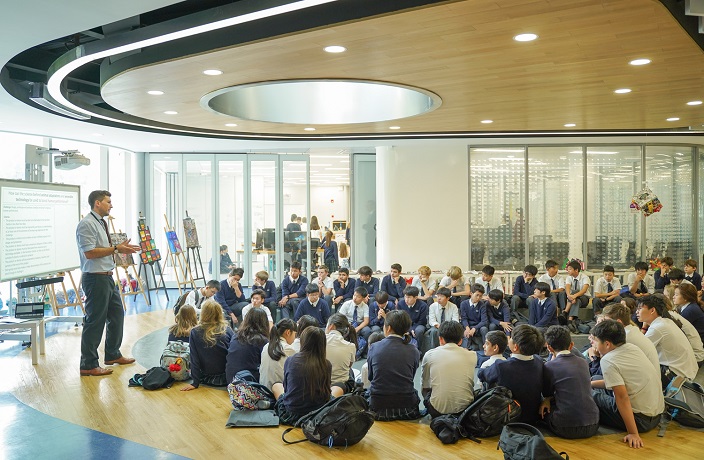As 2018 comes to a close, we sat down with five Shanghai teachers to talk about the year ahead and delve into an element of their college program. They tell us about developments for 2019 and how they encourage all students to embrace the opportunities that will prepare them for the world after graduation.
This week, we talk with Edward Beechey, who is the Assistant Headteacher (Curriculum) at the British International School Shanghai, Puxi.
You opened two new purpose-built STEAM centers this year. Can you tell us about the impact this has had on the school?
 At BISS Puxi, the Da Vinci Centre and the Hamilton Innovation Centre lie at the heart of our Primary and Secondary campuses. This reflects the importance we place on STEAM at BISS. In our regular 'challenge weeks,' whole year-groups come together to design, prototype and fabricate new technologies in response to real-life problems. The design of the centers allows students to develop their 'dirty' and 'clean' fabrication skills in the Fablab and Maker-Space, engineer and code in the Computing and Robotics Suite and develop their design and editing skills in the Graphics Suite, the Cinema and TV Studio. The fact that this takes place under one roof allows our students to develop an understanding of the Design Thinking Process that underpins our vision for STEAM.
At BISS Puxi, the Da Vinci Centre and the Hamilton Innovation Centre lie at the heart of our Primary and Secondary campuses. This reflects the importance we place on STEAM at BISS. In our regular 'challenge weeks,' whole year-groups come together to design, prototype and fabricate new technologies in response to real-life problems. The design of the centers allows students to develop their 'dirty' and 'clean' fabrication skills in the Fablab and Maker-Space, engineer and code in the Computing and Robotics Suite and develop their design and editing skills in the Graphics Suite, the Cinema and TV Studio. The fact that this takes place under one roof allows our students to develop an understanding of the Design Thinking Process that underpins our vision for STEAM.
What plans does BISS have to evolve and enhance the current STEAM program in 2019?
As part of Nord Anglia Education's STEAM collaboration with MIT, our students work on a series of challenges inspired by MIT professors. Our Year 9 students are currently investigating ways in which the science of animal adaptations and wearable technologies can boost human performance. For example, students are spending the next month working with our resident Olympic gold-medallist, Marlon Devonish, to learn about how he used wearable technologies to boost his performance. As a former elite athlete, Marlon works closely with the academic staff and students to give realworld examples of how wearable technologies are applied in training and competition.

What excites you most about teaching STEAM and its place in the future of education and development?
I am excited about how STEAM can enhance learning across the entire school. There is no debate that young people who can go out into the world with the skills, confidence and creativity to harness and even invent new technologies hold the key to the future. Our USD2 million investment in our Primary and Secondary innovation centers, our partnership with MIT and the BISS STEAM curriculum is an exciting combination that will allow our students to develop their love of innovation and design.

How do you inclusively engage all students'levels of interest in STEAM subjects?
One of the most exciting elements of our STEAM program is its reach. In Primary, twice a term, each year group has the opportunity to design and fabricate for a week at a time in the Da Vinci Centre. In Secondary, all Key Stage 3 students work on at least one month-long challenge a year in addition to their projectbased STEAM curriculum. Students also have the opportunity to engage in a range of STEAM based extra-curricular projects. These include competing in international robotics and engineering competitions, taking part in national Nord Anglia STEAM festivals and even visiting MIT to work with undergraduates on their latest research. At BISS we differ from other schools by talking about STEAM rather than STEM; placing art and design at the heart of our curriculum. A range of our students are currently collaborating with Billy Tan, a notable graphic novelist who has worked for Marvel and DC comics, to bring their own superheroes characters to life in his studio. With so many STEAM-based opportunities available at BISS, it is unsurprising that such a diverse range of students 'play creatively' irrespective of their age, academic profile or gender.
[All images via British International School Shanghai, Puxi]
Edward Beechey is the Assistant Headteacher (Curriculum) at the British International School Shanghai, Puxi, and has worked in China for seven years. In his current role, Edward focuses on academics and curriculum development. Edward has worked closely with professors at Nord Anglia's STEAM partners MIT, to create a robust STEAM Program that allows students to solve real-world problems.


















